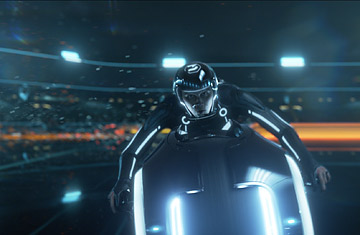
Garrett Hedlund is shown in a scene from the the Disney film Tron
In the Troniverse — which is to say, the land in which the 1982 film Tron is hailed as a prescient classic rather than that legendarily bad Jeff Bridges movie where he wore a glow-in-the-dark wrestler's helmet — fans know that the direst of fates is to be "subject to immediate deresolution". This is a formal way of saying you'll be deleted, an act that looks like an explosion of pixels and neatly references the disposal of an opponent in a video game.
But I found it a fitting description for the experience of watching Tron: Legacy, the sequel much-anticipated by passionate admirers of the original and mostly confusing to the rest of us. Tron: Legacy de-resolved me. It activated my couch potato impulses. I wanted to loll in my chair enjoying its dark cinematography, punctuated by aesthetically appealing neon, while Daft Punk's strangely soothing electronica washed over me. The movie is like visiting Satan's spa.
Robbed of my own resolution meant that I never worked up any dislike for the movie. Tron: Legacy is not good, but it is amiable. While it seems less like a parody than the original, it is also silly in a not unpleasing way. I generally have little use for 3-D, but the effects in this film are subtle and well-executed; as these things go, the least obnoxious ever. Also, I love Jeff Bridges, and here were three of him: one the real, present-day Jeff, nicely grizzled and saying "Man" a lot; then two computer-generated younger versions, one nice, one evil, both handsome and strapping, although troubling to look at in the same way that a Jeff Koons sculpture of Jeff Koons is troubling.
There are no innovations in plot, just some standard father issues and a need to escape. Director Joseph Kosinski, making his feature film debut, opens with a prologue set in 1989, in which Kevin Flynn (Jeff Bridges, the non-villainous youthful model) tells a bedtime story about his "Tron" adventures to his young son Sam. Then Kevin disappears into the night on a motorcycle, never to be seen again. Soon the boy is a tragic orphan with tons of cash. When we see Sam next he's a grown man (Garrett Hedlund, a more macho Hayden Christensen) emotionally crippled by his father's desertion. He lives in an industrial man-cave, with only a dog and gadgets to keep him company, and refuses to be involved in Encom, the Microsoft-like corporate beast that is his father's legacy, unless it's to cause mischief.
Kevin's old partner Alan (Bruce Boxleitner, reprising his role from the original) refuses to believe that Kevin is dead. The supposition is that he's trapped within the Grid, the digital frontier which he continued to visit after the events of the first movie, pursuing a dream for mankind involving freedom, shared wisdom and technology — kind of like Linus Torvalds, but with James Cameron's ego.
A beeping page sent from Kevin's long-disconnected number entices Sam to the arcade his father used to run. A portal opens and Sam steps in, anticipating seeing his father. And Kevin is indeed there, dressing in flowing white outfits accessorized with prayer beads and spending a lot of time on a meditation pillow, but before Sam can find him he — like his father before him — is forced to join a group of sacrificial programs playing gladiator-like games involving glowing Frisbees. Sam, a "user" in Tronspeak, yells "I am not a program" a bunch. It does not quite have the emotional heft of the Elephant Man telling us "I am not an animal." I chalk this up to the fact that he and his opponents are dressed in skintight outfits that look uncannily like my set of Master Mechanics screwdrivers, which are also black and fetchingly trimmed with bright yellow. Mocking aside, the filmmakers do pay artful homage to the original Tron, right down to the headgear and modes of transport, while taking the look well beyond "Tron's" quaint dot-matrix origins. (The light cycles of old are stylishly reimagined as muscular super-bikes; better than a Segway any day.)
The main problem with the Grid, other than the dodgy opening hours of the exit portal Sam must reach in order to escape, is that it's kind of a stultifying place. The film's logic is too muddled to be engaging. The requisite hot girl, Quorra (Olivia Wilde), has a drearily familiar childlike interest in the world of mankind. The main villain, Clu, (Bridges again, youthful and evil this time) wants to escape the Grid and take over the planet. But the digital recreation isn't perfect; he looks just like young Bridges if young Bridges had had way too much plastic surgery, so it's hard to take him seriously. Clu seems more like an unfortunate Botox victim than a dastardly despot. The only lively spot in Tron-land is a bar run by Castor (a giddy Michael Sheen) where programs go to unwind with a glass of day-glo contrast fluid. Just for a minute, I questioned why programs needed to consume anything. Then I resolved to de-resolve, sinking back into the film's elegant lethargy.
